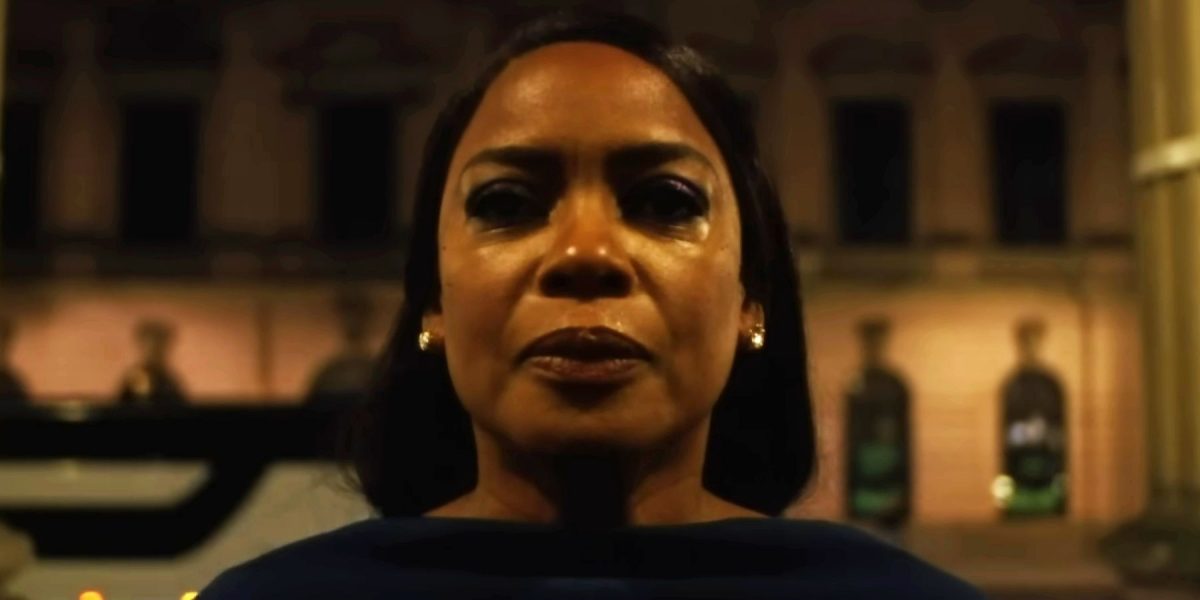
Convincing, Engaging & More Conventional Than It Seems
Oct 7, 2023
Summary
Ava DuVernay’s Origin is a challenging film that aims to explore the idea of racism as a caste system, drawing from Isabel Wilkerson’s book Caste. The film effectively visualizes anecdotes and historical events to support Caste’s argument through dramatic recreations and flashbacks to different time periods and locations. While the film delves into Isabel’s personal life and experiences, the connection between the personal narrative and the larger ideas of the film feels under-developed, leading to an alienating and disappointing ending.
The essential project of Ava DuVernay’s Origin is a challenging one. Its source material, Isabel Wilkerson’s Caste: The Origins of Our Discontents, is a non-fiction book that compares America’s treatment of people of color, Nazi Germany’s treatment of Jews, and India’s treatment of Dalits (formerly called untouchables) to show that much of what we ascribe to racism is better understood as a caste system. This film aims to explore that idea through a work of fiction, depicting Wilkerson’s research process and her life at the time. I have not read Caste, and so cannot comment on how well Origin adapts it, but the tension between fiction and non-fiction is a major part of the viewer’s experience regardless. What works for me and what doesn’t have left me torn, and though I ultimately do recommend this movie, it’s entirely possible that what I’m actually recommending is Wilkerson’s book.
The film begins with a dramatic rendering of the night Trayvon Martin was killed. Stylistically, this will prove crucial — Origin will visualize many of the anecdotal accounts and historical events that illustrate Caste’s argument. But this is also the inciting incident for Isabel (Aunjanue Ellis), a journalist-turned-author whose former editor approaches her at an event for her award-winning first book, hoping to coax her back for an article on the Martin case. Instead, it plants a difficult question in her mind: How can racism be the explanation we use for everything? She sees the killing of a Black 17-year-old by a Latino man ostensibly to protect a predominantly white neighborhood, and she isn’t content with American society’s go-to catch-all. There must be another word for what happened here.
Aunjanue Ellis in Origin
Isabel soon formulates the theory that is the backbone of Caste, and sets out to find proof. Her research, and her quest to communicate her findings with as much clarity as possible, is one strand of Origin’s storytelling, and its most successful. As the filmmaker behind 13th, a documentary about the US prison system that builds its argument brick by brick until it looks as unassailable as it is compelling, DuVernay is uniquely suited to this material. The power of Wilkerson’s thesis is so well articulated that it’s easy to emerge from the movie feeling like you’ve learned something profound. Ellis’ performance is a crucial part of this — she captures the exciting, passionate rush of figuring something out that only this kind of investigation can provide. Isabel’s scholarly and journalistic process is treated like a creative one, and the scenes of her sharing her findings are captivating because of it.
Also key to this, and perhaps the greatest justification for this adapting Caste as fiction, are the historical recreations. Isabel learns multiple stories that find a place in her argument, and DuVernay chooses to show them to us, taking us to places and times as disparate as the Jim Crow South, Nazi-controlled Berlin, 1910s Harlem, and British-controlled India. The subjects of some stories become recurring characters, their narratives returned to throughout the film. They are not just well-crafted period pieces (though, as a German speaker, I did chafe at and question Victoria Pedretti and Finn Wittrock playing a 1930s German couple), but the heart of Origin’s emotional impact. Isabel notes that the dehumanization required by caste systems is difficult to enact at the level of the individual, when someone’s unique personhood is on full display. These flashbacks let us experience potentially abstract hardships through people we (to some extent) get to know, and the humanity of the victims of caste becomes undeniable.
Jon Bernthal and Aunjanue Ellis in Origin
The other narrative strand in Origin is Isabel’s personal life, specifically her experience with loss. Jon Bernthal as her husband Brett and Niecy Nash-Betts as her cousin Marion loom large in this section, each capturing a warmth and gentleness that nicely contrast the cruelty and violence of Isabel’s research. Scenes with this focus are no less watchable, and for most of the movie, I felt as invested in the character drama as in the intellectual pursuit. But I was waiting for the two strands, which feel quite separate, to come together – to speak to each other. Only during Origin’s final act, which makes an aggressive play for a big swell of emotion, did my appreciation start to curdle. The major connection I could see, with Bernthal’s character representing how love can overcome caste divides, felt under-explored. Why spend so much time on Isabel’s life if not to further the film’s larger ideas?
I’ve realized that Origin is more like a traditional biopic than it initially seemed. DuVernay gives time to Isabel’s grief to show how much Wilkerson was dealing with when she created her great work, just as a sports movie might stack everything against its underdog hero before the big game. Even the title, singular when Caste’s subtitle uses the plural, shifts emphasis from the book’s contents to its author. I found the ending, which aggressively deploys form to communicate the capital-I Importance of this achievement (instead of trusting the work itself to have made its case), both alienating and disappointing. I do not regret having seen it, and with all there is to recommend it, I feel comfortable suggesting you seek it out upon release. But do so with tempered expectations.
Origin premiered at the Venice Film Festival on September 6 and is scheduled for theatrical release in the US in late 2023. The film is 135 minutes long and is not yet rated.
Publisher: Source link
Jennifer Lopez Finally Understands Mi Gente Latino Meme
Jennifer Lopez Finally Understands Mi Gente Latino Meme Kicking off 2025, J.Lo is now promoting Unstoppable, a new biography drama in which she stars alongside Moonlight actor Jharrel Jerome. At the 2011 American Music Awards, Jennifer won Favorite Latin Artist…
Jan 11, 2025
Tom Holland's Dad Shares Insight Into Zendaya Engagement
Tom Holland became the greatest showman for his proposal to Zendaya. Just days after the Spider-Man actress turned heads at the 2025 Golden Globes with a 5-carat ring on that finger, Tom's dad... Disclaimer: This story is auto-aggregated by a…
Jan 11, 2025
Aubrey Plaza Issues Statement After Jeff Baena’s Death
The 40-year-old star and Jeff’s family issued a statement to People on Monday, where they called their loss an “unimaginable tragedy.”The Los Angeles County coroner’s office previously determined that Jeff died by suicide in his LA home. He was 47…
Jan 10, 2025
Jill Duggar’s Husband Clarifies Where He Stands With Jim Bob Duggar
Jessa Duggar (m. Ben Seewald)Jim Bob and Michelle's fifth child, Jessa Duggar, was born Nov. 4, 1992. Jessa met Ben through church and he began courting her in 2013—the old-fashioned approach to romance coming as a brand-new notion to a lot…
Jan 10, 2025











